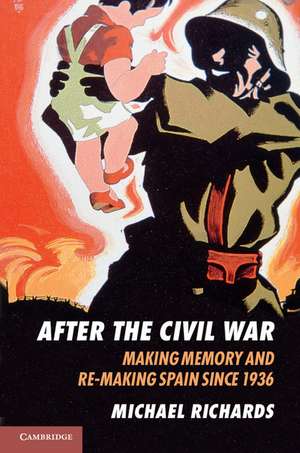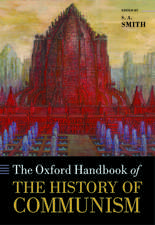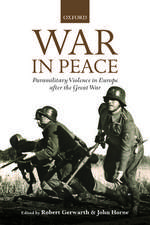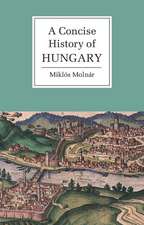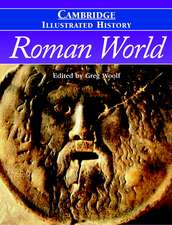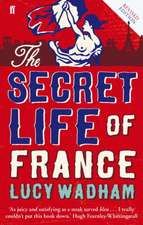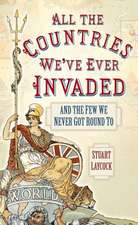After the Civil War: Making Memory and Re-Making Spain since 1936
Autor Michael Richardsen Limba Engleză Paperback – 31 iul 2013
| Toate formatele și edițiile | Preț | Express |
|---|---|---|
| Paperback (1) | 275.85 lei 6-8 săpt. | |
| Cambridge University Press – 31 iul 2013 | 275.85 lei 6-8 săpt. | |
| Hardback (1) | 705.24 lei 6-8 săpt. | |
| Cambridge University Press – 31 iul 2013 | 705.24 lei 6-8 săpt. |
Preț: 275.85 lei
Nou
Puncte Express: 414
Preț estimativ în valută:
52.79€ • 54.91$ • 43.58£
52.79€ • 54.91$ • 43.58£
Carte tipărită la comandă
Livrare economică 15-29 aprilie
Preluare comenzi: 021 569.72.76
Specificații
ISBN-13: 9780521728188
ISBN-10: 0521728185
Pagini: 414
Ilustrații: 8 maps
Dimensiuni: 150 x 228 x 23 mm
Greutate: 0.59 kg
Ediția:New.
Editura: Cambridge University Press
Colecția Cambridge University Press
Locul publicării:Cambridge, United Kingdom
ISBN-10: 0521728185
Pagini: 414
Ilustrații: 8 maps
Dimensiuni: 150 x 228 x 23 mm
Greutate: 0.59 kg
Ediția:New.
Editura: Cambridge University Press
Colecția Cambridge University Press
Locul publicării:Cambridge, United Kingdom
Cuprins
Introduction: cultural trauma in Spain; Part I. Setting the Scene: 1. War memories since 1936: political, moral, social; 2. Democracy, civil war, and intimate violence in the 1930s; Part II. Memories of War during the Franco Years: 3. Repression and remembrance: the victors' liturgy of memory; 4. Repression and reproduction: social memory in the 1940s; 5. Memory and politics: from Civil War to Cold War; 6. Memory and migration: flight from the countryside during the 1950s; 7. Commemorating Franco's peace: the 25th anniversary of the victory; 8. Contesting Franco's peace: transformation from below in the 1960s; 9. Transition and reconciliation: politics and the Church in the 1970s; Part III. Memories of War after Franco: 10. Transition and consent: the presence of the past, 1975–80; 11. 'The level of our times': memory and modernisation, 1981–96; 12. Collective identity and the ethics of memory, 1996–2007; Conclusion: the history of war memories in Spain; Sources and bibliography.
Recenzii
'Almost forty years after Franco's death, the history of the Spanish Civil War and dictatorship in Spain remains a cultural and political battleground. Michael Richards, with the same rigour and imagination shown in his previous research, explores in this book the relationship between multiple memory narratives of the Spanish Civil War. The result is a masterpiece of cultural history and the study of historical consciousness.' Julián Casanova, University of Zaragoza
'This highly original and conceptually exciting book makes a major contribution to the history of twentieth-century Spain. Meticulously researched and richly nuanced, it shows with clarity and insight how memories and meanings forged by the civil war became the prism through which Spaniards 'made sense' of rapid and shattering historical change from the 1940s onwards - from the country's experience of extreme economic austerity to industrial take-off, mass migration, rural depopulation and dizzying urbanization, all the way through to the democratic transition itself. Dr Richards offers us a trailblazing book which opens up the social and psychological universe made by Francoism.' Helen Graham, Royal Holloway, University of London
'Michael Richards' impressively researched new work establishes him as a major figure in the field. Illuminating Spain's vertiginous passage from the horrors of civil war, through the appalling hardship of the 1940s and 1950s to the rapid economic growth of the 1960s and the dramatic transition from dictatorship to democracy, Dr Richards goes way beyond the conventional boundaries of social history. His interpretation of these changes is enriched by a perception of the continuing effects of the mass trauma of civil war and dictatorship. In consequence, he has produced an important and groundbreaking work.' Paul Preston, London School of Economics and Political Science
'… [a] brilliant study …' Jörg Auberg, satt.org
'… an incisive and erudite study of the interaction between memory and history … At the same time, the book is a vibrant social history, with chapters on the fierce repression after the Civil War, massive migration within Spain during the '50s and the role of the Church to reconcile the two sides.' William Chislett, translated from El Imparcial
'This will no doubt be a highly decorated, prize-winning book that has something to offer all students and scholars of modern European, and specifically Spanish, history. Summing up: essential.' Choice
'[Richards'] account of how memories of the Civil War have, over the last eight decades, shaped and been shaped by social processes is masterly: anyone wanting to know about the history of Spain since the 1930s would do well to start with this book.' Jo Labanyi, Cultural and Social History
'Richards' main strength is his superb capacity to read from different authors and very diverse sources, from newspapers to cultural histories, and to assemble them into a coherent narrative. The result is a book that delves into a broad array of topics and perspectives, from high culture to oral stories, that illuminate how the regime imposed its vicious and self-serving memory project onto an impoverished and traumatized society.' Antonio Cazorla-Sanchez, Journal of Modern History
'This highly original and conceptually exciting book makes a major contribution to the history of twentieth-century Spain. Meticulously researched and richly nuanced, it shows with clarity and insight how memories and meanings forged by the civil war became the prism through which Spaniards 'made sense' of rapid and shattering historical change from the 1940s onwards - from the country's experience of extreme economic austerity to industrial take-off, mass migration, rural depopulation and dizzying urbanization, all the way through to the democratic transition itself. Dr Richards offers us a trailblazing book which opens up the social and psychological universe made by Francoism.' Helen Graham, Royal Holloway, University of London
'Michael Richards' impressively researched new work establishes him as a major figure in the field. Illuminating Spain's vertiginous passage from the horrors of civil war, through the appalling hardship of the 1940s and 1950s to the rapid economic growth of the 1960s and the dramatic transition from dictatorship to democracy, Dr Richards goes way beyond the conventional boundaries of social history. His interpretation of these changes is enriched by a perception of the continuing effects of the mass trauma of civil war and dictatorship. In consequence, he has produced an important and groundbreaking work.' Paul Preston, London School of Economics and Political Science
'… [a] brilliant study …' Jörg Auberg, satt.org
'… an incisive and erudite study of the interaction between memory and history … At the same time, the book is a vibrant social history, with chapters on the fierce repression after the Civil War, massive migration within Spain during the '50s and the role of the Church to reconcile the two sides.' William Chislett, translated from El Imparcial
'This will no doubt be a highly decorated, prize-winning book that has something to offer all students and scholars of modern European, and specifically Spanish, history. Summing up: essential.' Choice
'[Richards'] account of how memories of the Civil War have, over the last eight decades, shaped and been shaped by social processes is masterly: anyone wanting to know about the history of Spain since the 1930s would do well to start with this book.' Jo Labanyi, Cultural and Social History
'Richards' main strength is his superb capacity to read from different authors and very diverse sources, from newspapers to cultural histories, and to assemble them into a coherent narrative. The result is a book that delves into a broad array of topics and perspectives, from high culture to oral stories, that illuminate how the regime imposed its vicious and self-serving memory project onto an impoverished and traumatized society.' Antonio Cazorla-Sanchez, Journal of Modern History
Notă biografică
Descriere
A fascinating study of how the memory of Spain's bloody civil war has been contested from 1939 to the present.
